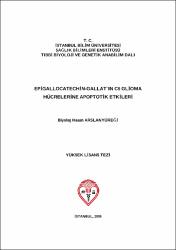Epigallocatechin-gallat`In C6 glioma hücrelerine apoptotik etkileri
Künye
Arslanyüreği, Hasan. (2009). Epigallocatechin-Gallat`In C6 Glioma Hücrelerine Apoptotik Etkileri. Yayımlanmamış yüksek lisans tezi. İstanbul : İstanbul Bilim Üniversitesi, Sağlık Bilimleri Enstitüsü.Özet
Çay (Camellia sinensis), dünya çapında yaygın bir içecektir. Yeşil çayın temel bileşeni olan Epigallocatechin-gallate (EGCG) metastaz (yayılma), invasyon (saldırı), anjiogenezis (kan damarları oluşumu) ve kanser gelişimini önleme etkileri ile yakından ilişkilendirilmiştir.
Son yıllarda olan araştırmalarda kanser tedavisinde kanserli hücreleri programlanmış hücre ölümüne yönlendirecek maddelerin üzerinde çok durulmuştur. Biz de çalışmamızda EGCG`nin farklılaşma karşıtı bir etki gösterdiği hipotezimizi C6 glioma hücrelerinde programlanmış hücre ölümüne veya apoptoza yönlenmeyi sağlayıp sağlamadığına bakarak araştırdık.
Hücrelerimizin EGCG ile muamelesi sonrasında apoptotik oluşumu TUNEL metodu ile gözlemleyip fotoğrafladık. Alan sayımları sonunda elde ettiğimiz verileri ANOVA testi ile karşılaştırdık. ANOVA testinin burada kullanım amacı birden fazla parametreyi ve interaksiyonları karşılaştırmaya olanak tanımasıdır.
24, 48 ve 72. Saatler sonunda 50 ve 100 µg/ml dozlarda EGCG`nin etkilerini inceledigimiz hücre kültürlerimizde apoptoza yönlenmenin dozla daha yakından ilişkili olduğunu ve uygulama süresinin de önemli bir faktör olduğunu gördük. 24 saatlik hücre kültürlerimizde 50 ve 100 µg/ml de apoptozun olduğunu, 48. saatte bunun doz artışıyla arttığını, ama en yüksek apoptozun 72. saatte ve 100 µg/ml dozda yani zaman ve doz interaksiyonuyla en yüksek oranda etkinin görülebileceğini saptadık.
Sonuç olarak EGCG`nin normal hücrelerle kıyaslanınca tümör hücrelerine karşı seçimli apoptotik etkisi (selective appoptotic effect) onun kanser ile savaşta daha çok araştırılması gereken bir alternatif olabileceğini düşündürmektedir. Tea (camellia sinensis) is a universally widespread beverage. The basic component of green tea, Epigallocatechin-gallate (EGCG), is closely related to its effects in preventing metastasis, invasion, angiogenesis and development of cancer. In recent years, research into cancer treatment has focused heavily on substances that may lead to the programmed elimination of cancer cells.
This study was designed to investigate the effect of green tea catechin; Epigallocatechin gallate (EGCG), on the apoptosis of C6 glioma cell lines. We photographed the apoptotic formation of our cells after treatment with EGCG using the TUNEL method. After counting the cells, we compared the results we had obtained with the ANOVA test. The purpose of using the ANOVA test here was to be able to compare with multiple parameters and interactions.
The cell cultures were measured at periods of 24, 48 and 72 hours for the effects of EGCG at dosages of 50 and 100 µg /ml. The apoptotic cells were stained using the TUNEL assay. It was observed that the interaction of higher dosage together with longer time periods was the crucial perameter in inducing apoptosis.
Apoptosis occurred in our 24-hour cultured cell lines at dosages of 50 and 100 µg /ml. The apoptosis increased in our 48-hour cultured cell lines at the same dosages. But the highest rate of apoptosis was observed at the longer time period (72 hours), and at the highest dosage (100 µg /ml).
In conclusion, this selective apoptotic effect of EGCG on C6 glioma cell lines renders EGCG worthy of further study to better understand the fundamental action mechanism(s) of tea constituents and the potential usefulness of tea as a highly bioavailable cancer-preventive agent.


















